Pragusa Announces Direct Flights from New York, Los Angeles to Dubrovnik
A LinkedIn message from the Managing Director of Pragusa One, Kresimir Budinski, with some UNBELIEVABLE news. The press release in full.
FOR IMMEDIATE RELEASE
London (3/5/2021) - Pragusa.One is delighted to announce non-stop flights from the United States to Croatia this summer. Three weekly flights from Los Angeles (LAX) and New York (EWR) to Dubrovnik (DBV) will be operated by Airbus A330 and A340 aircraft. The inaugural flight from New York scheduled for 21st June 2021 followed by the inaugural flight from Los Angeles scheduled for 22nd June 2021. The service will be maintained until the end of October 2021.
The company will operate Airbus A330-300 between New York and Dubrovnik offering 15,700 seats in total. The flights will operate on Monday, Wednesday, and Saturday from New York and Dubrovnik.
Airbus A340 will be engaged on the flights between Los Angeles and Dubrovnik offering 14,700 seats in total. The flights will operate on Tuesday, Thursday, and Sunday from Los Angeles and Dubrovnik.
“We worked hard since summer 2020 to create this unique product for avid travelers that are ready and steady to fly abroad. Point-to-point flight operations bundled with a full travel package and premium in-flight service are key success factors for the ultimate travel experience in the future. The US market represents one of the focus markets for Pragusa.One” said Kresimir Budinski, managing director at Pragusa.One Ltd.
Ticket sales start on 24th May 2021. Group reservations and information on full travel packages available to travel agents per request over email This email address is being protected from spambots. You need JavaScript enabled to view it. or website www.pragusa.one
# # #
About Us
Pragusa.One Ltd. is a UK-based travel company established in August 2020. The company is offering full travel packages to Europe from America, Asia, and South Africa with a focus on Central and Eastern Europe (CEE).
Media inquiries: This email address is being protected from spambots. You need JavaScript enabled to view it.
Looking for information about the Pearl of the Adriatic? Check out the Total Croatia Dubrovnik in a Page guide.
For the latest flight updates, check out the TC Flights to Croatia page.
Highlights of the Week: 5 Big Events in Croatia from April 26 - May 2, 2021
May 2, 2021 - Political tensions, sport achievements, the latest in terms of the pandemic… as we begin a new month, here are TCN's five highlights of the week, recapping the big events in Croatia from April 26 to May 2, 2021.
April left us with positive and negative moments and others of great uncertainty. Croatia went through its worst stage during the epidemiological crisis ever since the pandemic began just over a year ago, marked not only by the increase in infections but also by the failure of the virtual vaccination portal. Questions towards the government, the rowing world cup in Zagreb, new measures to try to tackle the pandemic: here's a quick review of this week in news.
New measures announced to try to deal with the pandemic
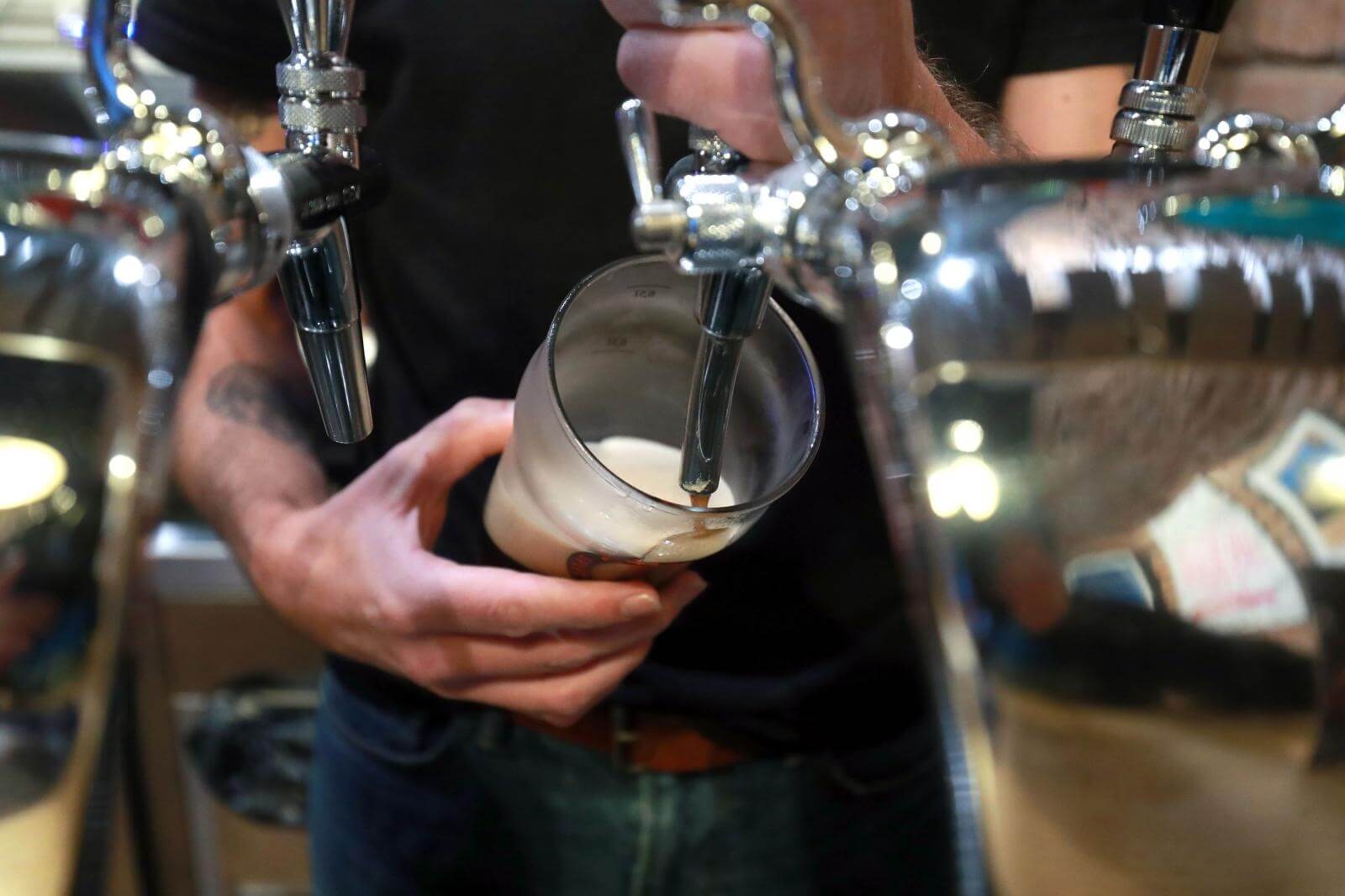
Measures will relax when it comes to the sale of alcohol prohibition hours (Credits: Pixsell)
After a month in which the epidemiological situation in the country was marked by an increase in infections in the country, the Croatian Civil Protection Directorate announced on April 30 that containment measures, instead of being tightened up, will instead be relaxed. One such measure relaxation is that the prohibition hours for the sale of alcohol will no longer be from 20:00 but from 22:00, and will continue to last until 06:00. Similarly, the service hours of catering and hospitality facilities will be from 06:00 until 22:00 and not until 20:00, as things stood previously.
Changes in the Croatian vaccine rollout
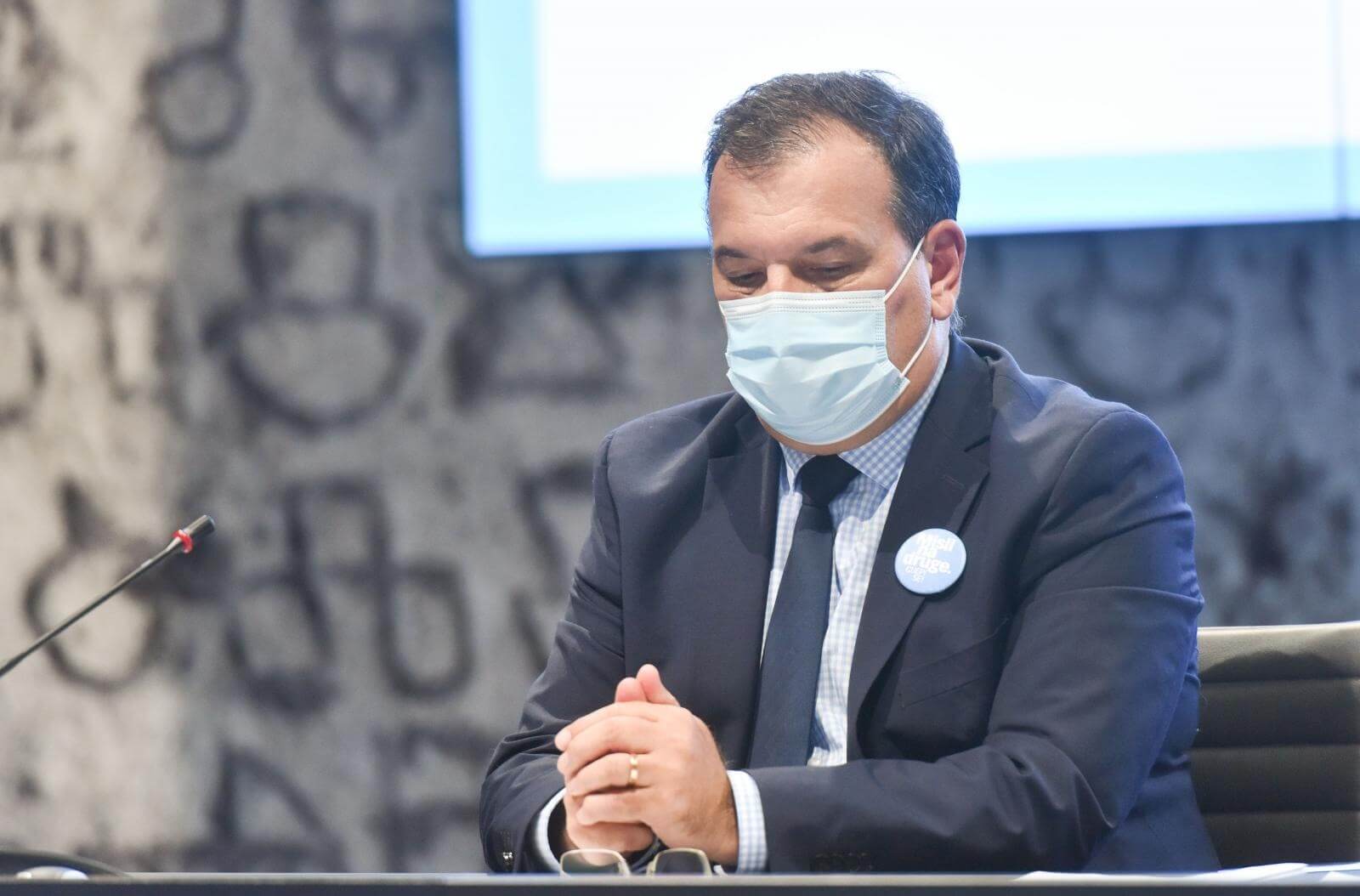
Health Minister Vili Beroš shared news this week about changes on the vaccination plan (Credits: Pixsell)
The colossal failure of the Cijepi se platform, available for Croatian residents to virtually enroll in the vaccination process in the country, produced a wave of criticism towards the government. Thus, on April 30, Health Minister Vili Beroš announced that the vaccination plan will be carried out differently. Beroš invited Croatia's residents to register with their family doctors either in person or by phone, in such a way that they can prepare a record of those registered and thus be able to send them the date, time, and place to go for their coronavirus vaccination. He also announced that more vaccines will be arriving in the coming days, as well as an increase in vaccination points. Finally, he motivated the population to continue obeying the epidemiological measures to fight the virus, even though the numbers in recent weeks have decreased.
For all you need to know about coronavirus specific to Croatia, including travel, border and quarantine rules, as well as the locations of vaccination points and testing centres across the country, make sure to bookmark our dedicated COVID-19 section.
Croatian National Recovery and Resilience Plan arrives at the European Committee
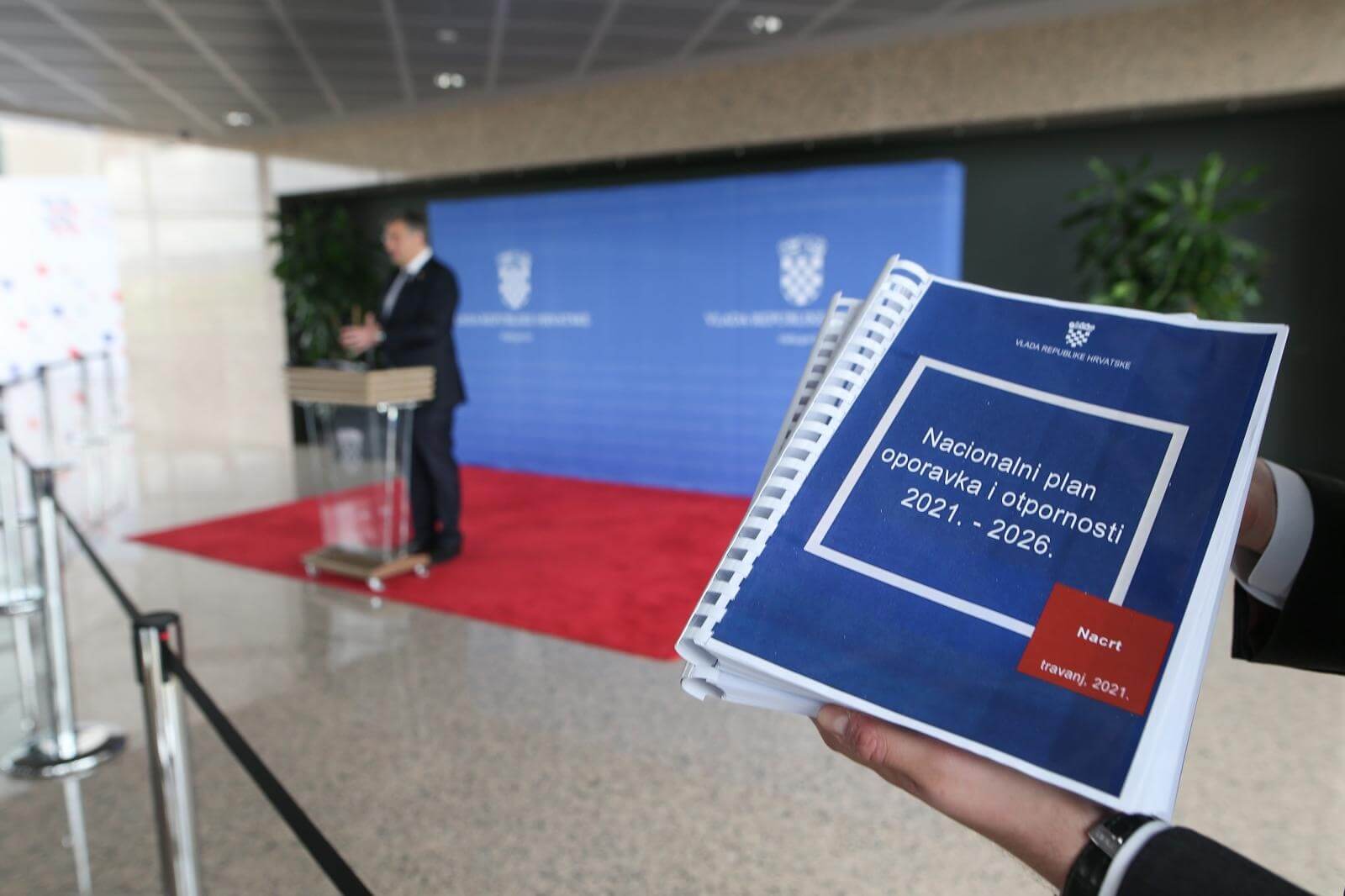
Prime Minister Andrej Plenković announced and supported the National Recovery and Resilience Plan in public (Credits: Pixsell)
The Croatian Government adopted the National Recovery and Resilience Plan this week, with a value of 49 billion kuna to be executed in the period between 2021 and 2027, and which will be presented at the offices of the European Committee. The 1,100-page document contains descriptions of 77 reforms and 152 investment plans, to be covered by European Union funds. The plan, which has been the target of questions and criticism, seeks to strengthen sectors such as business; public administration, justice and the state; education; science; research; the labour market; social protection; healthcare; and the "Reconstruction of buildings" initiative. Despite concerns, Prime Minister Andrej Plenković affirmed that it is a key document that will allow the country to raise its economy and be more resistant to future crises.
For more about politics in Croatia, make sure to check out our dedicated section.
Gold for Croatia at the Zagreb Rowing World Cup
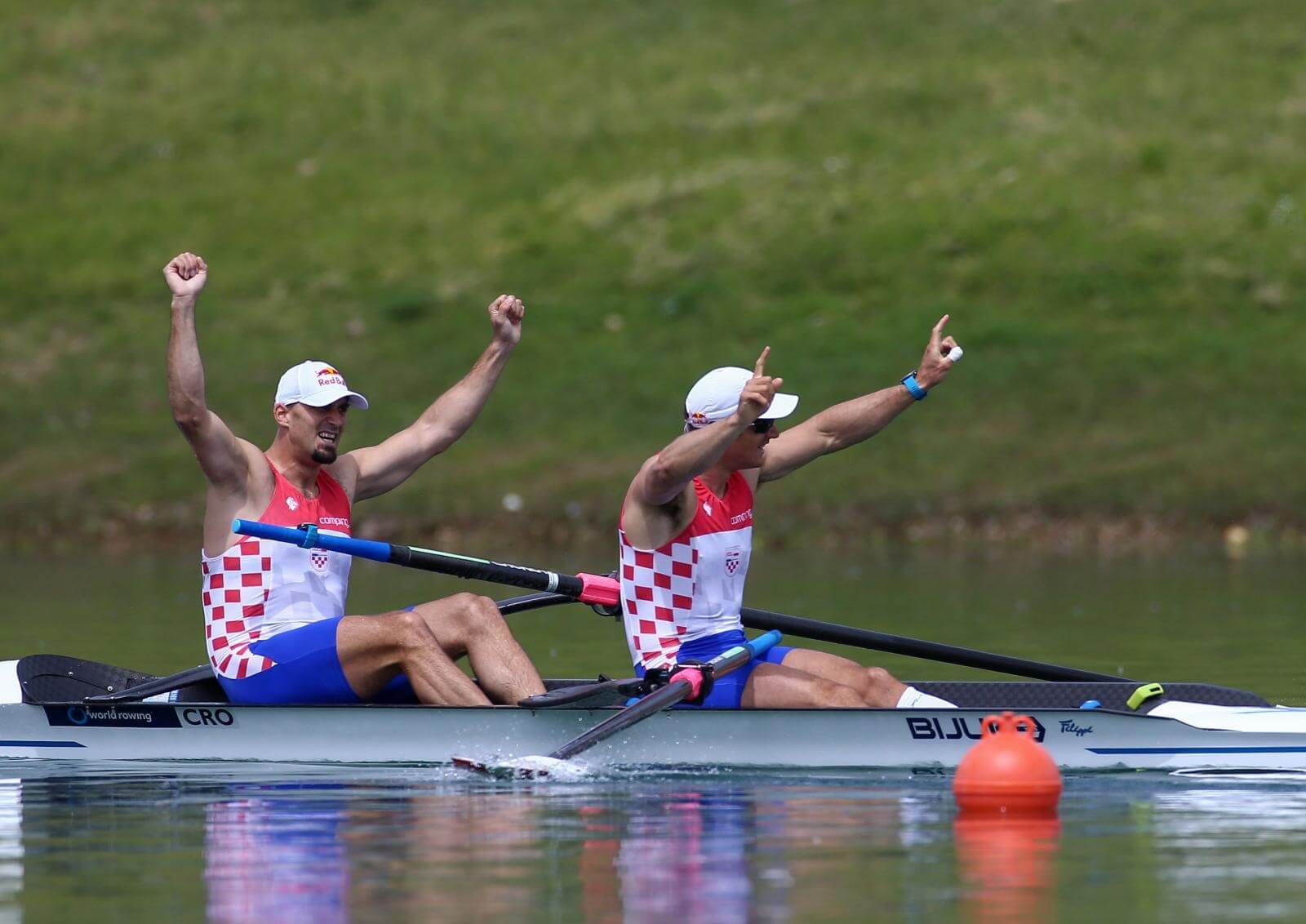
Brothers Valent and Martin Sinković won gold at the Zagreb Rowing World Cup at Lake Jarun (Credits: Pixsell)
It was a week of a lot of sporting activity in the country. As the World Rally Championship in Croatia unfolded successfully, the FIA announced that the country will be the host of the WRC calendar for two more years. But, without a doubt, the most special of this week in the sports field in Croatia has been the Zagreb Rowing World Cup, where athletes from all over the world competed on Lake Jarun. The event was a very significant one, as the brothers Valent and Martin Sinković, as well as the sisters Ivana and Josipa Jurković; took the gold yesterday, on May 1st. Both pairs of siblings achieved the feat in the category of coxless pairs.
To follow the latest sports news in Croatia, follow TCN's dedicated page.
To learn more about sport in Croatia, CLICK HERE.
Direct flights from New York and Los Angeles to Dubrovnik this summer
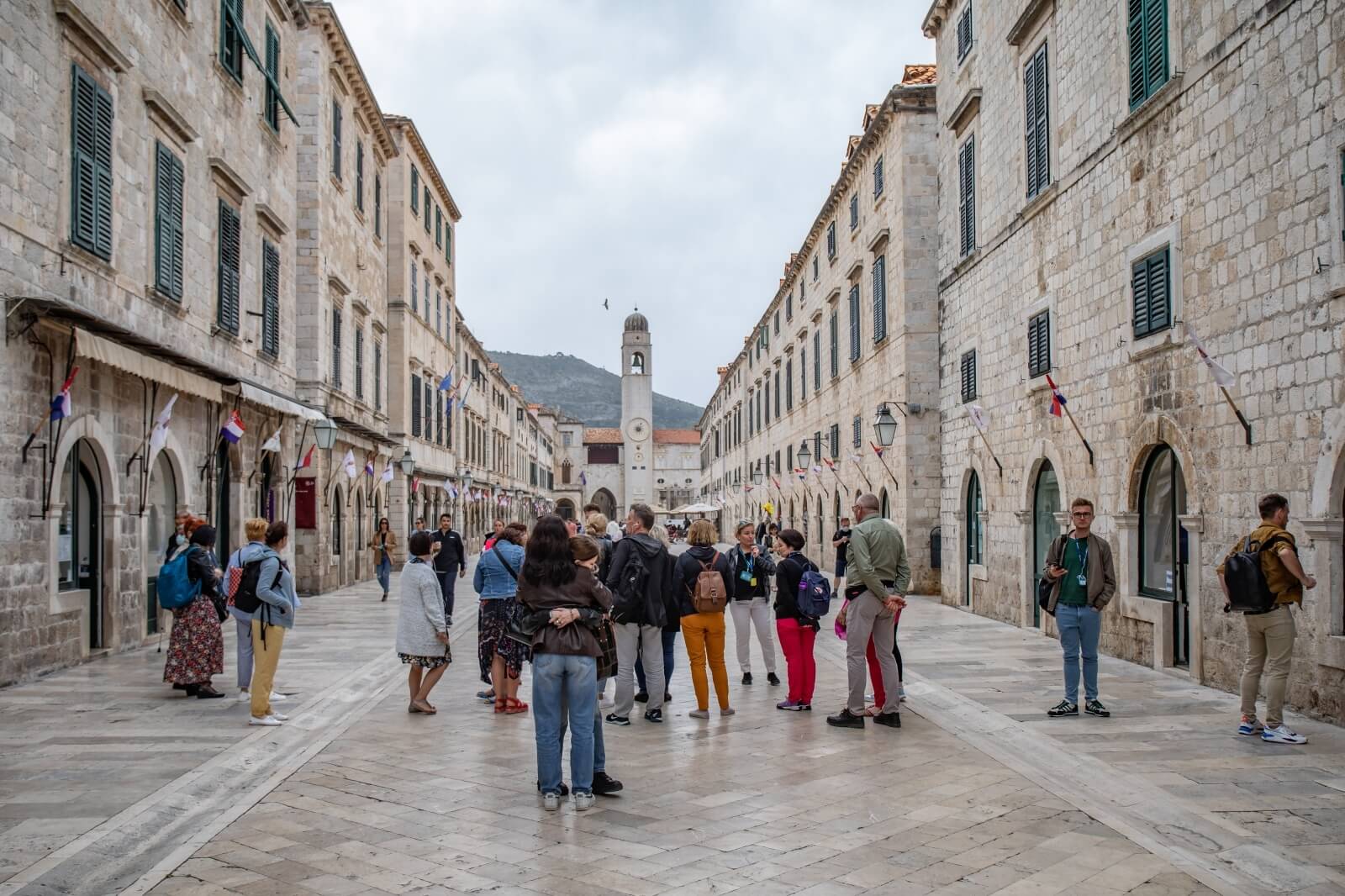
Three weekly flights from New York and Los Angeles to Dubrovnik will start in June 2021 (Credits: Pixsell)
And in our latest and most recent highlight of the week, Pragusa.One announced today that three weekly flights from the cities of Los Angeles and New York to the city of Dubrovnik have been confirmed for the month of June. The great relationship between the two countries, as well as the positive situation of the vaccination process in the United States, promises at least one nice summer season for American tourists interested in visiting the Pearl of the Adriatic and its surroundings. The inaugural flight from New York will take place on June 21, and the following day a flight will depart Los Angeles. From then on, three flights per week will be scheduled for Tuesdays, Thursdays, and Sundays.
For the latest flight updates, check out the TC Flights to Croatia page.
From Monday to Sunday, we list five events featured on the front pages of Croatia's news portals.
To follow all news from Croatia, subscribe to our newsletter.
30th Anniversary of Death of 12 Special Policemen Commemorated in Borovo
ZAGREB, 2 May 2021 - Commemorative events were held in the village of Borovo on Sunday in tribute to 12 special policemen killed there by Serb paramilitaries in an ambush on 2 May 1991.
The 12 Croatian policemen were killed in an ambush in the night between May 1 and 2, 1991 after coming to Borovo in an attempt to rescue two of their colleagues who were captured the night before by Serb paramilitaries.
After negotiations on their release failed, a group of members of special police forces from Vinkovci were sent to Borovo on May 2. In a conflict with Serb paramilitaries that followed, 12 of them were killed and another 21 were wounded.
The policemen who were killed were Stjepan Bošnjak (born in 1955), Antun Grbavac (1961), Josip Culej (1966), Mladen Šaric (1965), Zdenko Perica (1965), Zoran Grašic (1969), Ivica Vučić (1961), Luka Crnković (1970), Marinko Petrušić (1966), Janko Čović (1965), Zeljko Hrala (1968) and Mladen Čatić (1971).
For more about the homeland war in Croatia, follow TCN's dedicated page.
Zagreb and Other Nearby Cities Remember Victims of May 1995 Shelling
ZAGREB, 2 May 2021 - Seven civilians were killed and more than 200 were wounded in Zagreb during the missile attacks launched by rebel Serb forces on 2 and 3 May 1995, and Zagreb and the nearby cities, which were also shelled in those retaliatory attacks, marked the 26th anniversary of those tragic events on Sunday.
No fatalities were in Karlovac, Sisak, Jastrebarsko, however, considerable material damage was caused to them when Serb paramilitaries shelled them and Zagreb's centre with cluster bombs in retaliation for the defeat suffered in Operation Flash in western Slavonia the day before.
The retaliation was publicly admitted to by the then leader of rebel ethnic Serbs, Milan Martic. Seven people were killed, 39 seriously injured and another 136 sustained lesser injuries.
The first explosions were heard around 10.23 a.m. on 2 May when several shells were fired on downtown Zagreb.
The shelling a day later was directed at a children's hospital, a retirement home, and the national theatre building.
The UN war crimes tribunal in The Hague (ICTY) found Martic guilty of crimes against humanity and violations of the laws and customs of war committed against Croats and other non-Serbs in Croatia in the early 1990s, sentencing him to 35 years in prison. It also found him guilty of ordering missile attacks on Zagreb in May 1995.
In October 2008, the ICTY Appeals Chamber confirmed the 35-year prison sentence for that former Croatian Serb political leader, for crimes committed against Croats and other non-Serbs in Croatia between 1991 and 1995.
The initial indictment against Martic was issued on 25 July 1995. After several years on the run, he surrendered to the Tribunal on 15 May 2002. The trial started on 13 December 2005 and concluded on 12 January 2007.
In May 2020, Croatia's judicial authorities also sentenced Serb rebel general Milan Čeleketić for those missile attacks to 20 years after he was tried in absentia. Čeleketić is beyond the reach of Croatia's authorities. He lives in the northern Vojvodina city of Subotica, and Serbia's authorities.
For more about the homeland war in Croatia, follow TCN's dedicated page.
Payment of Croatian COVID Pension Supplements Begins
May the 2nd, 2021 - The payment of Croatian COVID pension supplements for the country's retirees has begun. To briefly recall, the decision was pending up until quite recently after several other European countries decided to add funds to the pensions received in their countries.
Now that the details have finally been ironed out, the Croatian COVID pension supplements are beginning to be paid out with the regular monthly amounts received in the bank accounts of Croatian pensioners.
As Poslovni Dnevnik writes, those with a pension of up to one and a half thousand kuna per month will receive an additional 1200 kuna on top of their normal monthly income. Retirees with incomes from one and a half to two thousand kuna will receive a supplement of 900 kuna, and those with a pension of two to three thousand kuna per month will receive an additional 600 kuna bonus.
The smallest Croatian COVID pension supplements are for other groups with higher monthly pensions. The smallest amount of 400 kuna will go to those pensioners with a pension of three to four thousand kuna per month. The second payment is scheduled for July for the beneficiaries of this scheme who receive a foreign pension in addition to a normal Croatian one.
''In total, we have provided about 600 million kuna for this purpose and the rest of the amount will be paid in the future phase for those who receive a pension from two countries (meaning a foreign pension as well as a Croatian one). This is an incentive for Croatian pensioners and a supplement that makes sense to compensate for certain costs incurred during the ongoing coronavirus pandemic,'' stated Labour Minister Josip Aladrovic, and as was reported by HRT.
For more, make sure to follow our dedicated lifestyle section.
Change to Croatian Vaccination Procedure for Those Who Contracted Virus
May the 2nd, 2021 - Krunoslav Capak has announced changes to the Croatian vaccination procedure for those people who have already contracted and recovered from the novel coronavirus, SARS-CoV-2.
As Poslovni Dnevnik writes, the Croatian vaccination procedure was tweaed a couple of days ago, with those who have already suffered the virus in mind.
''We published an amendment to the recommendations on receiving the coronavirus vaccination. Those who return positive results on antigen tests are being accepted into the database of coronavirus patients, but are not added to the number of positive results received from PCR tests. We accepted the use of these rapid tests for border crossings when more than half of European countries accepted the same. We also took that risk because rapid tests aren't as sensitive as PCR tests are, but in the last two or three months there has been an improvement in the sensitivity of these tests,'' stated Krunoslav Capak at a recent press conference of the National Civil Protection Directorate.
“The British experience is that no thromboembolism has been reported after receiving the second dose of the AstraZeneca vaccine. If, after receiving the first dose of the vaccine, a person becomes ill, then they should receive the second dose of the vaccine three to six months after their recovery. Our recommendation is that people who have received the first dose of AstraZeneca also receive the second dose.
We vaccinate against coronavirus the second time twelve weeks after the first dose is received. We've been asked if that period could be shortened if someone is travelling somewhere and can't be present for their second vaccination. The manufacturer's recommendation is 8-12 weeks, and maybe even a little earlier. We've also been asked about side effects. I'm the side effects reported to HALMED here, from 0.3 to 0.5 percent. So, every 200th or 300th person reports a side effect, and most of them are mild issues: pain, fever and the like after vaccination. That's not all. Many people feel mild side effects but don't report them. Therefore, there's no need to worry. This reaction is proof that something is happening in the body. This is very normal and happens with most other vaccines,'' explained Capak.
“People who have already contracted and since recovered from the novel coronavirus should only be vaccinated with one dose. The second dose after their recovery doesn't really contribute to their level of immunity, as has been shown by the research of Professor Alemka Markotic. This has now become an official decision. Everyone who has recovered the disease will receive only one dose of the vaccine,'' said Capak when discussing the changes to the Croatian vaccination procedure.
For all you need to know about coronavirus specific to Croatia, including travel, border and quarantine rules, as well as the locations of vaccination points and testing centres across the country, make sure to bookmark our dedicated COVID-19 section.
Croatian Startup Revuto Aims to be Fifth Biggest Startup Investment in 2021
May the 2nd, 2021 - Croatian startups are becoming more and more well known on the international scene as the great minds this country continually produces take to the world stage in various entrepreneurial and innovative forms. The Croatian startup Revuto is just one of them, and it is aiming to become the name to hold the fifth highest startup investment this year.
As Bernard Ivezic/Novac writes, the Croatian startup Revuto has announced that it is entering an investment round with which it aims to become the holder of the fifth largest startup investment this year. The company's ambitious plan is to raise a massive nine million euros in capital.
In the first quarter of this year, Croatian startups attracted more than a billion kuna in investments. The largest investment, from Porsche, was received by Rimac Automobili, followed by Endava's acquisition of Five, the Menlo Ventures investment in Photomath, then Swisscom Ventures and their investment in Cognism, followed by the M + Group's entry into the Croatian startup Bulb.
The Croatian startup Revuto would jump from a target of about 11 million US dollars and be just between Cognism with 12.5 million dollars and Bulb with 8.5 million dollars.
Revuto, launched by Josipa Majic and Vedran Vukman, is developing an application (app) that would manage an individual's subscriptions - from Netflix to Apple and from Google to PlayStation, even including the likes of Tinder, Spotify and Asana. The idea is that on this mobile application, users will be able to manage their monthly subscriptions as they do with video or virtual machines. They could pause, cancel, pay, track and add, all in one place.
More will be known in the next ten or so days as the startup plans to officially present its investment round and start raising funds.
The Croatian startip Revuto was initially conceived for the payment of subscriptions, and therefore has an internal user reward system. It was this option that the Croatian startup launched at the beginning of last year, just before the pandemic struck, when it invited users to subscribe to its website and collect reward points, which can be exchanged for subscriptions, or so-called Revuto tokens. However, in order to be able to use them, it was of course necessary for the startup to launch a mobile application, which has been announced for the autumn of this year, ie after raising fresh capital.
Rewarding users is also important because the Croatian startup Revuto intends to compete with PayPal and Revolut with its functionality. Both parts of their popularity are due to the possibility that subscriptions can be managed through them in one place, but not even close to the level promised by Revuto.
So far, the wildly popular Revolut has gone the furthest here, as it allows you to leave credit card numbers that you have virtually created within Revolut's application to various Internet services, which you can turn off or cancel at any time. This actually allows for unsubscriptions, as the online service can no longer be charged given that you have cancelled your ''virtual'' card.
However, apart from the size of the new Revut investment round, the way in which it will be implemented is also of interest. This is the first major decentralised finance (DeFi) project in all of Croatia. DeFi, after the inital coin offering (ICO), which were the crypto counterparts of the IPO, went a step further.
Investors in DeFi seek earnings not only through tokens or cryptocurrencies, but also through the actual use of financial instruments that are created through DeFi. The Croatian startup Revuto has announced on its website that it plans to issue a REVU token on the Cardano blockchain and that it will have several interesting applications to boast of.
Cardano’s cryptocurrency, ADA, is the sixth largest in the world with a market capitalisation of more than 42.5 billion dollars. The top five are Bitcoin, Ether, Binance coin, Ripple and Tether.
The Croatian statup Revut's interest in joining DeFi isn't particularly surprising, as it experienced a big jump a couple of years ago. With 40 million dollars invested in such projects back in early 2019, it has exceeded 40 billion dollars to date. That's why it remains the focus of investors' interest in the crypto world today. However, it should not be forgotten that it is high-risk, that many compare the risk of investing in DeFi with that of ICOs, and that there are those who have been very badly burned because of DeFi projects.
How Revuto's planned DeFi will fare remains to be seen, as they are still explaining their business model. They state that the average European consumer spends 130 euros a month on subscriptions, which is about five percent of their total monthly consumption.
''Almost a fifth of consumers never check their subscriptions, which is why half of them often pay for products and services that they either no longer use or do not consider valuable. Revuto, a Croatian startup whose mission is to completely redefine the experience of subscription management and save its clients time, energy and money, has achieved sensational success. With the strong support of Cardano, a blockchain platform, Revuto is entering the first token hall on that platform with the aim of raising eight million euros of capital,'' they concluded from the startup.
For more on Croatian startups, follow our business page.
Living Costs in Dubrovnik and Zagreb Rival Brussels and Budapest
May the 2nd, 2021 - Living costs in Croatia are often generally lower than they are in Western Europe, allowing those coming from the likes of Germany, France and the United Kingdom to have even deeper pockets when living in Croatia, especially if they receive a foreign wage or pension. A look at costs shows that living costs in Dubrovnik and Zagreb rival those in European cities like Brussels and the Hungarian capital of Budapest.
As Marina Klepo/Novac writes, although mayoral or county candidates rarely talk about the cost of living in the constituencies in which they're running in elections, they would certainly have a good reason to do so. On the list of the cost of living in 608 cities across the world as looked into by the popular Numbeo portal, the global database of consumer prices (groceries, clothing and footwear, taxis, utilities, internet, transportation, restaurant offers, allocations for sports activities, for kindergarten, schooling), takes five Croatian cities into account. The most expensive are the living costs in Dubrovnik, which is unsurprising and which took a very high 65th place, the second is Zadar, in 275th place, followed by Split (312), Rijeka (322), Zagreb (346) with the cheapest being the Eastern Croatian city of Osijek, which took 374th place on the list.
When it comes to countries, on the list of all 138 of them, Croatia is takes 42nd place, and of the countries of Central and Eastern Europe, only Estonia (41st place) and Slovenia (38th place) are slightly more expensive, while life is in the rest of the countries in that general area is much cheaper. One reason for this, it seems, is the high cost of basic utilities, which include electricity, heating, water and other such costs for housing. Among 107 countries, Croatia ranks fairly high on that list, coming in at 17th place.
The monthly living costs in Dubrovnik for a family of four, as calculated by Numbeo, amount to as much as 23,888 kuna, without the cost of rent taken into account. When compared to the capital city of Zagreb Dubrovnik is 54.2 percent more expensive, while the rental price is 31.7 percent higher. On the other hand, a family of four in Osijek, without rent, needs 12,980 kuna per month, an enormous drop in comparison to Croatia's southernmost city. However, it is more expensive to live in all five Croatian cities than, for example, in Warsaw or Budapest.
The cost of living is just one of a number of criteria by which the quality of life in cities is assessed. When it comes to national capitals, last year's survey by a German company specialising in relocation, Movinga from Berlin, showed that among 150 cities, Zagreb ranks only 135th, and only the capitals of Lithuania, Latvia and Bulgaria are ranked worse. Cities are rated according to 16 criteria.
Thus, in the category of mobility, which shows the efficiency of private and public transport (the length and regularity of the system, the share of passengers in the total population, and the degree of traffic congestion), Zagreb is significantly worse than comparable cities from other countries in Central and Eastern Europe.
For more, follow our lifestyle page. Check out Living in Croatia for all you need to know.
University of Split: First in EU to Issue Europass Digital Certificates
May 1st, 2020 - A big step forward for the University of Split, as it is the first in the European Union to issue Europass digital certificates.
RTL reports, the University of Split has made a step forward at the European Union level in the application of Europass digital credentials, a European tool that enables the digitization of documents in formal and non-formal education. Namely, they became the first institution in Europe to successfully issue as many as 437 digital certificates of participation in January 2021 to participants in the international online conference Week of Innovative Regions in Europe - WIRE 2020, organized by the Faculty of Economics in Split.
"Given the importance of this event, we knew we had to issue certificates to participate and since I was actively participating in the European universities project in parallel, we looked for a testing ground for digitally signed credentials and somehow happily merged with each other," said Maja Ćukušić, Faculty of Economics in Split.
The Dean of the University, Dragan Ljutić, points out that the entire project of the digital European diploma started from them. "In today's time of digitalization, it is clear that we are seriously thinking about it, that is, that we have already started," said Dean Ljutić.
The University of Split, together with the universities of Cadiz, Brittany, Malta, Kiel and Gdansk, has been a member of the alliance called the European University of the Sea (SEA-EU) since October 2019. With the membership in the SEA-EU Alliance, the University of Split has been awarded almost one million euros in grants, which will be invested primarily in the networking of six universities at all levels in the three years of the project. Some of the activities within this project include work on the processes of automatic recognition of qualifications, digitization of qualifications, the introduction of the European Student Card, development of virtual and physical mobility, migration issues, creation of the Center for Socially Beneficial Learning, the connection of research capacities of six universities.
The digital credential has the same legal value as paper certificates, and will allow institutions to issue certificates of qualifications free of charge, such as diplomas and other learning credentials that cannot be illegally altered.
Individuals can store the obtained Europass digital credentials on their Europass profile on the new Europass platform and share it with employers when looking for a job, and employers have a better and more credible insight into the acquired skills and knowledge of potential job candidates.
"I was thrilled by the digital credentials because they are very easy to use and can be downloaded in pdf or image format and as such easily placed on business networks or paired with our Europass CV. I was also delighted that the exact listed competencies were acquired by workshops, and these competencies themselves are in line with internationally standard qualifications of education and as such are recognized throughout the European Union", says a student of the Faculty of Economics in Split Ana-Marija Ivčević.
To read more about news in Croatia, follow TCN's dedicated page.
The Story of Lady, Who Still Waits for Her Friend in Vodnjan
May 1, 2021 - Everyone knows the story of Hachiko, the dog who waited years for its deceased owner. But the story of Lady, from Vodnjan, is just as sweet and heartbreaking.
When we talk about dogs, the first thing that comes to mind is their unmatched loyalty. It is well known that dogs do not take long to show their affection to younger children or that they are often inseparable from their owners. Stories like those of Hachiko, the famous Japanese dog who, even after the death of her owner, never lost faith to one day meet him again.
Another that would prove that dogs indeed love forever, is the story of Lady, from Vodnjan.
As Jutarnji.hr reports, Lady is a 16-year-old dog who immediately fell in love with all of her family when she arrived in their lives. However, as said by Marijan Kancijanić, her real love story happened when she was five.
That great love was with her neighbor, Salko. Why? No one knows, but the two of them loved each other endlessly. His house was about 80 meters away from hers, in a parallel street. Close enough to go to him every day. The world has never seen such love.
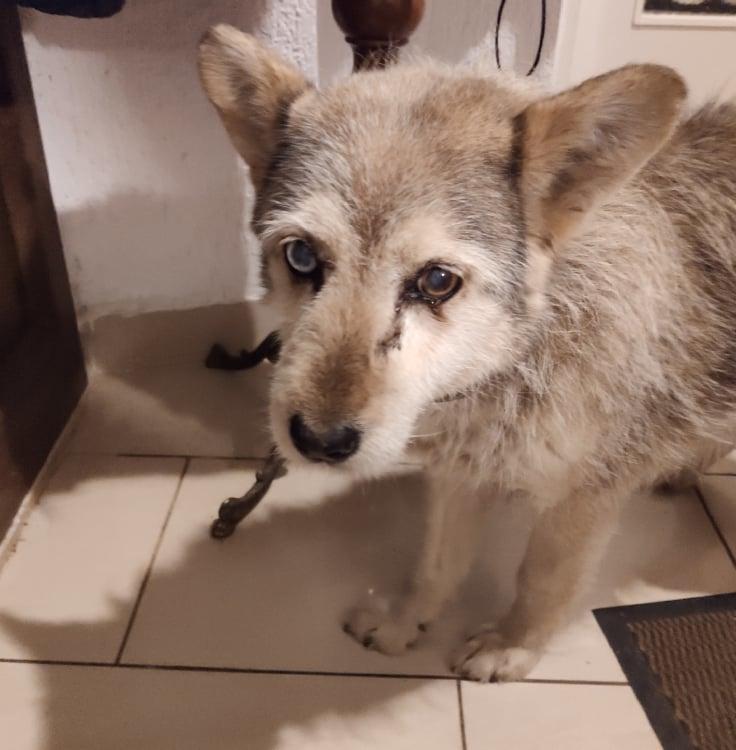
Credit: Private album.
''She followed him to the garden and the store every morning for an hour or two. They had their own timing. If she didn't show up one day, because she would be with us in the olive groves, he would definitely come that evening or the next morning to ask if she was okay. Also, when she came home with us, she would walk away for at least a minute to see him or at least sniff in front of Salko's house. I don't know exactly why, I guess to see if he is well, because he was a kidney patient'', says Marijan.
She was once trapped under the wheels of a car, so she was not there for a couple of days because she was recovering at home. Salko came to visit. He was crying, worried about the little one, and her tail would start working like crazy when she saw him. Sure, everything hurt, but when she saw him, everything was a little better.
''It didn't take long. About a year and a half after they connected, Salko passed away. As he left, part of her spirit disappeared with him. That was a full four years ago. From then until today, every morning and afternoon, Lady is constantly waiting in front of Salko's door'', explains Marijan.
And so, today, every day, regardless of rain, sun, or snow, Lady goes to Salko's house two or three times a day, at a time known only to her, depending on the season. She lays down on the sidewalk, her head facing the entrance, her sad gaze fixed on the door: waiting for him to appear. It doesn’t matter that he hasn’t appeared in four years, time is a human invention anyway and means nothing to dogs.
She understands that the sun has risen and set many times since her friend is gone, but she knows he will return. One day, Lady will come to the door and he will open it for her, hug her, give her a nice biscuit, and then the two of them, together, will slowly walk to the store, through their favorite streets, talking. Salko will tell her what is bothering him, and she will understand him in her canine way. And it will be as it used to be. One man and one dog, for a time beyond human comprehension, the discovery of two kindred spirits in this vast universe.
''I know she hopes to see at least one more time the man who took her everywhere with him, shared meals with her, talked to her... The late Salko entrusted his wife to take care of Lady for life. On his deathbed, he asked: "Is Lady coming?". Several times, when we would meet on my doorstep, he liked to hear the verses of Dino Dvornik's song from the Ballad of Shark: "Because a man is a man, and a dog is a dog, it's worth it for everyone, but not for us...", concludes Marijan.
If you want to know more about dogs and pets in Croatia, be sure to check Total Croatia's guide HERE.
For more news about Croatia, visit Total Croatia News dedicated page.


